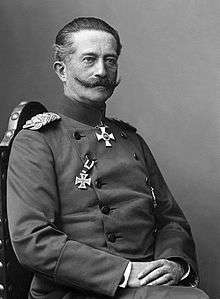Moritz von Bissing
Moritz Ferdinand Freiherr von Bissing (30 January 1844 – 18 April 1917) was a Prussian General.[1]
Moritz von Bissing | |
|---|---|
 | |
| Born | 30 January 1844 Ober Bellmannsdorf, Prussia |
| Died | 18 April 1917 (aged 73) Trois Fontaines near Brussels, Belgium |
| Allegiance | |
| Service/ | |
| Years of service | 1865–1908 1914–1917 |
| Rank | Generaloberst |
| Commands held | Gardes du Corps 29th Division VII Army Corps |
| Battles/wars | Austro-Prussian War Franco-Prussian War World War I |
Life and army career
Bissing was born at Ober Bellmannsdorf in the Province of Silesia. He was the son of Moritz von Bissing, a member of the landed gentry who was known to speak his mind to the Kaiser. In 1865 Bissing entered the Prussian Army as a lieutenant in the cavalry, and he soon saw active service in the Austro-Prussian War and the Franco-Prussian War. Gaining steady promotion, in 1887 the young Major was appointed as an aide-de-camp to the crown prince, who later became the Emperor Wilhelm II. He served in the guards cavalry until 1897, when he was given command of the 29th Infantry Division. From 1901 to 1907 Bissing commanded the VII Army Corps in Münster. In 1902 he was promoted to General of the Cavalry, and he retired from the army in 1908.
First World War
Upon the outbreak of the First World War, Bissing was recalled to active duty as deputy commander of the VII Army Corps, serving in that post from August until November 1914. After the fall of Belgium during the early months of the War, Bissing was promoted to Generaloberst and appointed as Governor-General of occupied Belgium, serving from December 1914 until a few days before his death in 1917.
As governor-general, Bissing executed the German Flamenpolitik, during which he netherlandized the Ghent University to make it the first solely Dutch-speaking university in Belgium. As the German Chancellor Bethmann-Hollweg encouraged Flemish nationalist leaders to declare independence and to integrate into the German sphere, Bissing convened a commission to organise the division of Belgium, issuing a decree on 21 March 1917 which separated Belgium into two administrative areas, Flanders and Wallonia. This was the first attempt at dividing Belgium along linguistic lines.
Taking into account the decision by Walloon nationalists in 1912 to recognize Namur as the central city of Wallonia, Bissing established the Walloon administration there. Wallonia then consisted of four southern Belgian provinces and the district of Nivelles, part of the province of Brabant, thus realizing another revendication of the Walloon movement, the creation of a Walloon Brabant. The Flemish region had Brussels as its capital and was made up of the four northern provinces of Belgium, as well as the districts of Brussels and Leuven.
Among many others, Bissing signed the warrant for the execution of Edith Cavell.
In April 1917 a chronic lung ailment forced Bissing to resign his post as Governor-General, and he succumbed to his illness a few days later, dying near Brussels on 18 April. He is buried at the Invalidenfriedhof in Berlin.
Notes
| Wikimedia Commons has media related to Moritz von Bissing. |
Regarding personal names: Freiherr was a title before 1919, but now is regarded as part of the surname. It is translated as Baron. Before the August 1919 abolition of nobility as a legal class, titles preceded the full name when given (Graf Helmuth James von Moltke). Since 1919, these titles, along with any nobiliary prefix (von, zu, etc.), can be used, but are regarded as a dependent part of the surname, and thus come after any given names (Helmuth James Graf von Moltke). Titles and all dependent parts of surnames are ignored in alphabetical sorting. The feminine forms are Freifrau and Freiin.
References
- "Von Bissing (General)". Library of Congress, Washington, D.C. 20540 USA. Retrieved 8 April 2020.
- Larry Zuckerman, The Rape of Belgium: The Untold Story of World War I, New York University Press, 2004, ISBN 978-0-8147-9704-4.
External links
- Bissing, Moritz Ferdinand Freiherr von at 1914-1918 Online Encyclopedia.
- Newspaper clippings about Moritz von Bissing in the 20th Century Press Archives of the ZBW